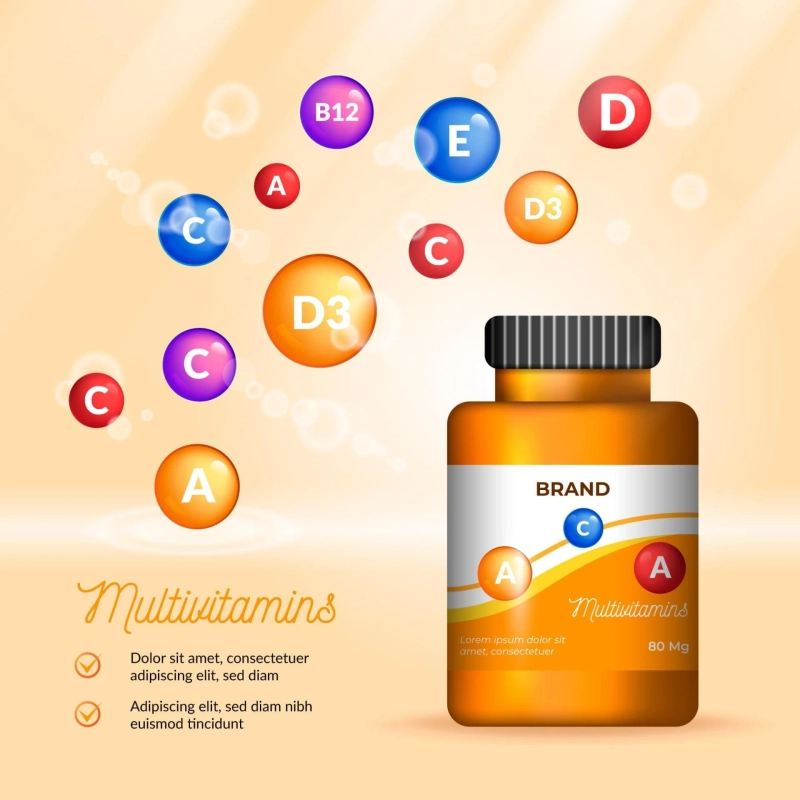Have you ever considered vitamin D3 to be a hormone? It is real! Moreover, it is a crucial hormone for the body. Getting adequate vitamin D has a number of advantages and is necessary for optimum health.
Why is vitamin D3 a crucial component?
One of the many health advantages of vitamin D3 (cholecalciferol) is that it facilitates the body’s absorption of calcium. Vitamin D3 is naturally present in foods such as fish, cow liver, eggs, and cheese. Upon exposure to ultraviolet (UV) rays from the sun, it can also be created in the skin.
There are more vitamin D3 supplement types that can be utilized for both general health and the treatment or prevention of vitamin D insufficiency.
One of the two varieties of vitamin D is vitamin D3. Vitamin D3 (ergocalciferol) is distinct from vitamin D2 in terms of both structure and sources.
The function of vitamin D supplements is described in the article, along with advantages and disadvantages particular to vitamin D3. Other significant sources of vitamin D3 are also included.
How does vitamin D3 function?
Just a few foods naturally contain vitamin D; it may also be added to other foods and purchased as a dietary supplement. Vitamin D is a fat-soluble vitamin. Moreover, the body spontaneously produces it when sunlight strikes the skin and triggers the production of vitamin D. ( Multivitamins )
Sunlight, diet, and supplements all contain physiologically inactive vitamin D that has to go through two hydroxylations in the body to become active. The first process, known as 25-hydroxyvitamin D [25(OH)D) or calcidiol, takes place in the liver.
Blood hormone calcitriol controls the metabolism of calcium and phosphate for bone formation and other physiological processes. When serum 25(OH)D concentrations reach 30 ng/mL (75 nmol/L), vitamin D sufficiency is attained.
The majority of vitamin D comes from exposure to the sun, however the quantity of sun exposure needed to maintain optimal levels varies depending on factors including age, skin colour, season, latitude, time of day, clothing preferences, and usage of sunscreen.
What advantages does vitamin D have?
1. It makes bones stronger.
2. It makes the immune system stronger.
3. It could shield against some cancers.
4. It could enhance brain function.
5. It improves your mood.
6. It can help people lose weight.
7. It may reduce the chance of developing rheumatoid arthritis.
8. It reduces the chance of type 2 diabetes.
9. It may assist in lowering blood pressure.
10. It may lower the chance of developing heart disease.
11. It can help to reduce inflammation.
12. It might improve oral health.
13. It can lower the chance of fractures.
14. It promotes healthy lung function.
15. It can help maintain a sound neurological system.
16. It may promote the growth of healthy hair.
17. It can enhance cognitive performance and stave against dementia.
How does vitamin D function?
Just a few foods naturally contain vitamin D; it may also be added to other foods and purchased as a dietary supplement. Vitamin D is a fat-soluble vitamin. Moreover, the body spontaneously produces it when sunlight strikes the skin and triggers the production of vitamin D.
Sunlight, diet, and supplements all contain physiologically inactive vitamin D that has to go through two hydroxylations in the body to become active. The first process, known as 25-hydroxyvitamin D [25(OH)D) or calcidiol, takes place in the liver.
Blood hormone calcitriol controls the metabolism of calcium and phosphate for bone formation and other physiological processes. When serum 25(OH)D concentrations reach 30 ng/mL (75 nmol/L), vitamin D sufficiency is attained.
The majority of vitamin D comes from exposure to the sun, however the quantity of sun exposure needed to maintain optimal levels varies depending on factors including age, skin colour, season, latitude, time of day, clothing preferences, and usage of sunscreen.
To reach and maintain optimal blood 25(OH)D concentrations, those with limited sun exposure must consume foods high in vitamin D or take supplements.
How much vitamin D must one to consume?
With vitamin D, there is no Recommended Dietary Allowance (RDA). The majority of individuals between the ages of 19 and 70, including pregnant and lactating women, should consume 600 IU (15 mcg) of vitamin D daily, according to the Institute of Medicine (IOM). ( immunity booster )
For adults, the IOM established an Upper Limit (UL) of 4000 IU (100 mcg) per day in order to reduce the risk of negative health effects from consuming too much vitamin D.
Due to their higher risk of vitamin D insufficiency, pregnant and lactating women, as well as adults over the age of 70, are advised to consume more than 600 IU of vitamin D each day.
Individuals with dark complexion are more likely to be vitamin D deficient and may require greater vitamin D doses. According to some experts, persons with dark complexion should consume up to 1000–2000 IU (25–50 mcg) of vitamin D daily.
Your age, skin tone, and amount of sun exposure are some of the variables that might determine how much vitamin D you require. You should discuss how much vitamin D you should take with your healthcare professional.
Do all people need to take vitamin D?
Because humans can manufacture vitamin D3 when our skin is exposed to sunlight, it is sometimes referred to as the “sunshine vitamin” and has several health advantages. Strong bones and teeth depend on vitamin D, which also aids in the body’s absorption of calcium.
Also, it strengthens our immune system and could fend against some chronic conditions like cancer.
Vitamin D may be obtained in a variety of ways, such as through sunshine, certain foods, and supplements. Deficits in vitamin D are rather typical, particularly during the winter when there is less sun exposure.


